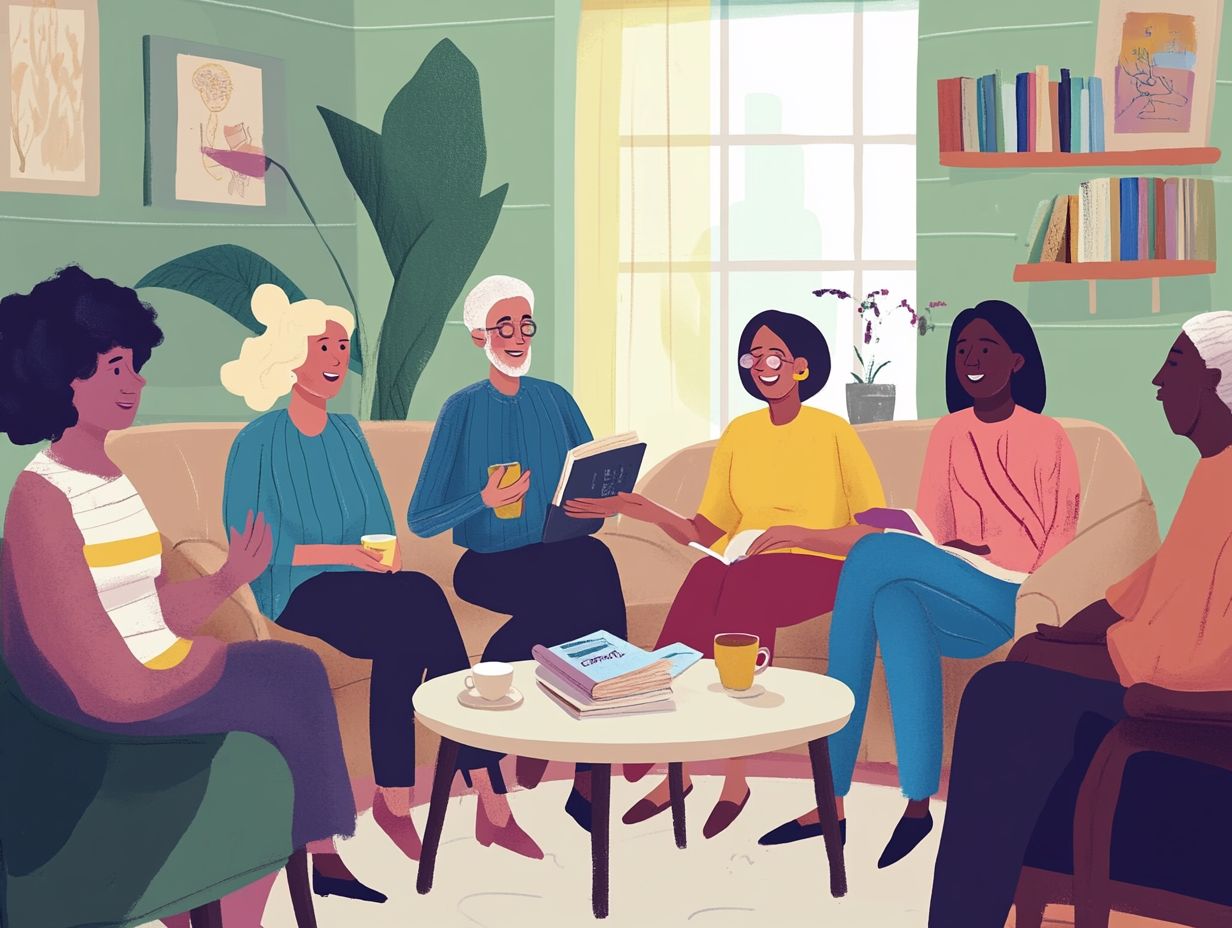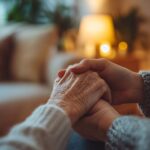Building a support network after cancer treatment is essential to aid in emotional and practical recovery. This network, comprising family, friends, healthcare providers, and advocacy groups, plays a pivotal role in enhancing the quality of life for cancer survivors. Understanding the importance of this supportive network, survivors can effectively navigate the challenges of their cancer journey and post-treatment life.
Developing a solid support system involves:
- Connecting with healthcare providers and community organizations
- Communicating needs clearly to family and friends
- Identifying and joining peer support groups and online forums
By fostering these connections, survivors can access comprehensive support, encompassing emotional encouragement, practical assistance, financial assistance, and valuable resources, all contributing to overall well-being, mental well-being, and recovery.
Key Takeaways:
Understanding the Importance of a Support Network After Cancer Treatment

A support network after cancer treatment is crucial for providing emotional and practical assistance to survivors, helping them manage daily tasks and transportation needs.
This network includes family, friends, healthcare providers, therapists, and advocacy groups, all contributing to the survivor’s quality of life and helping manage insurance matters and time management effectively.
Peer support groups and community organizations offer strategies, advocacy programs, and emotional support to help manage the challenges of cancer survivorship.
The Role of Support in Recovery
Support in recovery for cancer survivors includes emotional encouragement, therapeutic support, and practical assistance, which improve healing and quality of life.
Emotional support from loved ones, including social work and counseling, helps survivors manage feelings of fear, anxiety, and uncertainty, fostering resilience.
Healthcare professionals, including nurse navigators and social workers, provide practical support through therapy options, nutritional advice, and pain management techniques.
This support system forms a comprehensive network that aids survivors in regaining strength, navigating challenges, and achieving normalcy.
Building Your Support Network
Cancer survivors build a support network by connecting with healthcare providers, joining community organizations, engaging with advocacy groups, and utilizing wellness resources.
A support network provides emotional, informational, and practical assistance during recovery and survivorship, aiding in the healing process.
Survivors enhance their support by attending local support groups, participating in online forums, engaging in in-person meetings, and seeking resources from cancer foundations.
Identifying Potential Support Systems
Cancer survivors can identify potential support systems through family, community organizations, healthcare providers, and patient navigators.
Family offers emotional support, practical help, and is crucial for childhood cancer and adult cancer cases.
Community organizations provide connection with others who have had similar experiences, offering peer support and shared experiences.
Healthcare providers ensure medical guidance, mental health support, and connect patients with support resources and survivorship care.
These systems together form a robust support network for recovery, enhancing holistic health.
Communicating Your Needs
Communicating needs involves clearly expressing emotional and practical support requirements to family, friends, healthcare providers, and social workers.
Cancer survivors can communicate needs by using ‘I’ statements to convey feelings, being specific about the type of assistance required, including practical assistance and transportation needs.
Effective communication fosters deeper connections and increases the likelihood of receiving meaningful support, including financial assistance and insurance matters.
Types of Support to Consider

Types of support to consider during cancer treatment include:
- Emotional support: Counseling and therapy services.
- Practical support: Assistance with daily tasks and healthcare management.
- Peer support: Support groups and survivor networks.
- Advocacy resources: Information and aid from cancer advocacy organizations.
Emotional Support
Emotional support in cancer care involves providing resources like support groups, peer networks, and emotional nourishment to help cancer survivors cope with challenges.
Emotional support offers understanding, reduces isolation, connects individuals with similar experiences, and helps in navigating relationship changes.
Community organizations often provide workshops, counseling services, and telephone support to enhance resilience during recovery.
Practical Support
Practical support for cancer survivors involves assistance with everyday challenges like transportation, daily task management, financial aid, and addressing physical limitations.
Community organizations provide transportation to medical appointments, help with chores such as grocery shopping, offer financial resources for medical bills, and connect with patient navigators for comprehensive support.
Practical support reduces stress during treatment and recovery, allowing survivors to focus on healing and improving their quality of life.
Maintaining Your Support Network
Maintaining a support network involves actively engaging with friends, family, and support groups to provide emotional and practical help for cancer survivors, including oncology guidance and social work support.
Support networks are crucial for well-being, offering encouragement, sharing experiences, addressing challenges during recovery, and ensuring continuity of survivorship care.
Nurturing Relationships
Nurturing relationships provides emotional support for cancer survivors by strengthening connections with family, friends, peers, and caregivers, ensuring robust supportive networks.
Regular communication, expressing gratitude, and participating in group discussions help build a supportive network.
Sharing experiences fosters trust, companionship, and aids in emotional recovery, enhancing mental well-being.
Addressing Challenges

Cancer survivors face challenges in support networks that require strong communication to ensure emotional and practical support, including coping strategies and wellness resources.
Addressing challenges involves improving communication within family and friends to avoid misunderstandings, fostering open expression of concerns, and enhancing overall quality of life.
When internal support is insufficient, cancer survivors can seek guidance from advocacy groups for resources, peer connections, and survivorship care.
Self-Care During and After Treatment
Self-care during and after cancer treatment involves practices like maintaining a balanced diet, engaging in regular physical activity, seeking mental health support, and participating in wellness programs.
Self-care supports emotional well-being and holistic recovery by reducing stress, improving quality of life, and enhancing overall mental well-being.
Specific self-care actions include:
- Attending support groups
- Practicing mindfulness
- Consulting healthcare professionals for personalized guidance
Importance of Self-Care
Self-care is essential for cancer survivors to maintain emotional well-being, manage daily tasks during and after treatment, and cope with emotional challenges.
Self-care helps improve recovery by promoting control, reducing stress, boosting mood through activities like journaling, physical exercise, mindfulness practices, and enhancing overall wellness.
A support system of friends, family, or groups is crucial for emotional health, community connection, and coping with anxiety.
Ways to Practice Self-Care
Ways to practice self-care include engaging in mindfulness activities, incorporating regular physical exercise, connecting with support groups, and participating in therapeutic support.
Mindfulness activities, such as meditation, help clear the mind, while physical exercises like walking improve mood and health by releasing endorphins, supporting holistic health.
Support groups provide community, understanding, and connection with survivors network, essential for emotional well-being and coping strategies.
Frequently Asked Questions
1. How can I build a support network after cancer treatment?

Building a support network after cancer treatment is important for your physical and emotional well-being. You can start by reaching out to family and friends, joining a support group, connecting with other cancer survivors, and seeking professional counseling if needed. Engaging with community centers and hospitals can also provide additional support resources.
2. Is it necessary to have a support network after cancer treatment?
While it is not necessary to have a support network after cancer treatment, it can greatly benefit your recovery and overall health. A support network can provide emotional support, practical help, and a sense of community during this challenging time, including access to advocacy and wellness resources.
3. How can I find a support group for cancer survivors?
There are many ways to find a support group for cancer survivors. You can ask your healthcare team for recommendations, search online for local support groups, join a virtual support group, or participate in in-person meetings. You can also check with your local cancer center or hospital for any support groups they may offer.
4. What should I look for in a support group?
When looking for a support group, it’s important to find a group that meets your specific needs. Consider factors such as the type of cancer you have, your age group, and your personal preferences. It’s also important to find a supportive and non-judgmental group that promotes a safe and comfortable space for sharing, fostering shared experiences.
5. How can I connect with other cancer survivors?
In addition to joining a support group, there are other ways to connect with other cancer survivors. You can attend cancer survivor events, join online forums or social media groups, or reach out to other survivors through your healthcare team or support group. Connecting with others who have been through a similar experience can provide valuable support and understanding, vital for emotional challenges and coping strategies.
6. Should I seek professional counseling after cancer treatment?
It’s important to prioritize your mental health after cancer treatment, and seeking professional counseling can be helpful for many survivors. A therapist or counselor can provide a safe and confidential space to process your emotions and develop coping strategies. Don’t hesitate to reach out for professional help if you feel overwhelmed or struggling to cope with the aftermath of cancer treatment, ensuring continuity of survivorship care and therapeutic support.





